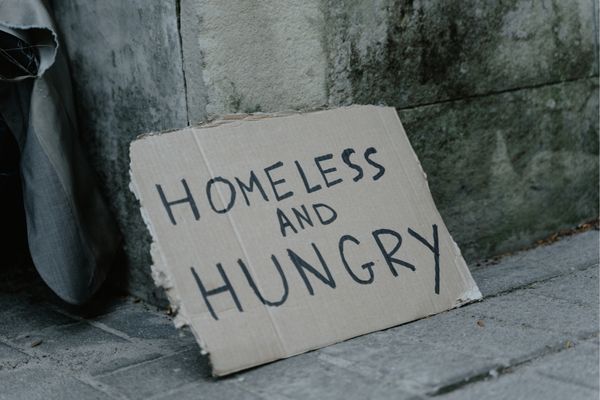Drug abuse and addiction are pervasive issues that affect homeless populations at consistently higher rates than the general public. While it’s true that many people who are homeless struggle with substance abuse, the relationship between addiction and homelessness is not as cut and dry as most might think.
Drug Addiction and Homelessness: Which Causes Which?
Homelessness is defined as an “individual or family who lacks a fixed, regular, and adequate nighttime residence”. Neither the pathway to homelessness nor the one to addiction is a straight line, it’s cyclical and with numerous potential entry points.
Addiction and homelessness have a pattern of dysfunction similar to that of co-occurring disorders (also known as dual diagnosis) where drug addiction and mental illness feed and worsen each other. Also like dual diagnosis, either can cause the other–here’s how:
How Addiction Can Cause Homelessness
It’s most common for substance abuse to be the cause of homelessness, rather than the other way around. According to a 2008 survey of U.S. city mayors, drug use was the number one cause of homelessness in their cities. In another survey, two-thirds of individuals experiencing homelessness at the time self-reported that substance abuse was the main reason that led to being homeless.
Drug use can damage a person’s relationships with their friends and family. The lack of this support system can leave a person extremely vulnerable to the domino effect aftermath of drug use leading to job loss, which is then followed by financial instability and inevitably leads to a lack of shelter. And because getting out of homelessness is a lot more difficult than just finding employment, once a person has reached this point, it can be incredibly challenging to overcome.
How Homelessness Can Cause Addiction
Drug addictions often come about because a person uses drugs as a coping mechanism for dealing with stressful situations. Homelessness is an incredibly stressful situation (so much so that it’s been directly linked to higher rates of having a severe mental illness and lower levels of recovery).
Regrettably, with no other support systems to turn to, many of the people experiencing homelessness will turn to drugs for relief from their problems. Drug abuse can make a person unemployable as well as ineligible for governmental assistance, leaving them socially stranded and without a lifeline.
For those who fall through social safety nets, their new reality is one where drug abuse is rampant and sometimes a social expectation within the homeless community. Many who find themselves in this situation have little to no motivation to stop using drugs. Homelessness can be considered a chronic condition in its own right. Even if addiction didn’t land a person on the streets, drugs are all too effective at keeping them there.
Other Potential Causes
When it comes to determining whether addiction caused homelessness or vice versa, it’s not a simple ‘either or’ situation. There are also numerous other conditions that could’ve been the primary factor in one or the other, or might have been an underlying factor in both.
Mental illness can play a major role as it can directly lead to an increased risk of homelessness and substance abuse. It’s estimated that over one-third of people experiencing homelessness have a mental illness. Of those, 25% have a serious mental illness.
There’s a significant overlap in the factors that can lead to both addiction and homelessness.
Homelessness and Addiction Statistics
A common misconception about people experiencing homelessness is that all of them are drug users or addicts. Aside from being dehumanizing and insensitive, it’s simply not true.
- There are an estimated 552,830 homeless people in the United States — approximately 0.2% of the population.
- Over half had either a mental disorder or a co-occurring mental illness and substance abuse disorders
- Homeless adults age 65 or older have a higher prevalence of unmet needs for substance use and mental disorder treatment compared with younger homeless adults
- People experiencing homelessness are at higher risk of overdose from illicit drug use
- 68% of men and 76% of women who are homeless and in substance use treatment reported experiencing a trauma-related event
- 38% of homeless people were dependent on alcohol and 26% abused other drugs compared to 15% of the general U.S. population
Getting Help for Homeless Individuals Struggling With Addiction
Government and private aid is often very limited and sometimes fails to reach the individuals who need their services the most. Peer-based support groups offer an always-free alternative for addressing substance abuse issues. Find the AA group or NA group closest to you today.
Sources:
https://www.nationalhomeless.org/factsheets/addiction.pdf
https://store.samhsa.gov/sites/default/files/SAMHSA_Digital_Download/PEP20-06-04-003.pdf
